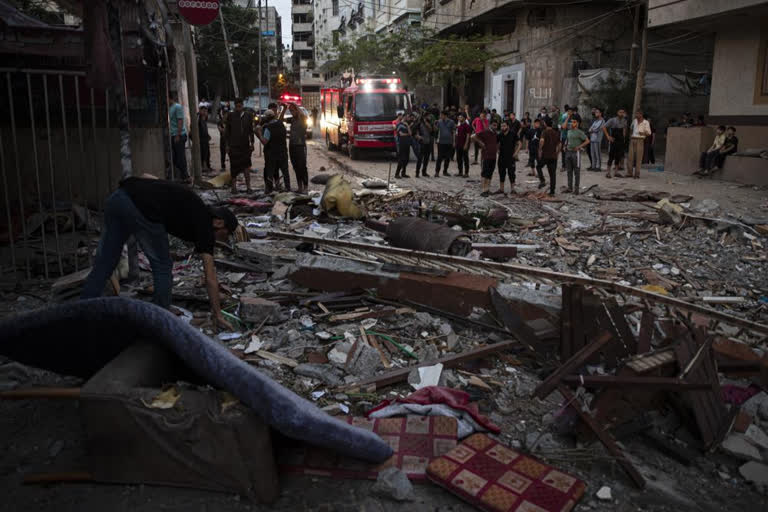Gaza City: Israel unleashed new airstrikes on Gaza early Tuesday, hitting the high-rise home of a Hamas field commander and two border tunnels dug by militants, as Hamas and other armed groups fired dozens of rockets toward Israel. The escalation in the conflict was sparked by weeks of tensions in contested Jerusalem.
In a further sign of rising tensions, Israel signalled it is widening its military campaign. The military said it is sending troop reinforcements to the Gaza border and the defence minister ordered the mobilization of 5,000 reserve soldiers.
Read:|Hamas targets Jerusalem after clashes at revered mosque
In the past, cross-border fighting between Israel and Hamas, the group that rules Gaza, would typically end after a few days, often helped by behind-the-scenes mediation by Qatar, Egypt and others. It was not clear if such a resolution would come this time.
Israeli Prime Minister Benjamin Netanyahu has warned that fighting could “continue for some time.” Lt. Col. Jonathan Conricus, an Israeli military spokesman, told reporters Tuesday that the military was in “the early stages” of strikes against Gaza targets that it had planned well in advance.
The overnight rockets and airstrikes were preceded by hours of clashes between Palestinians and Israeli security forces, including dramatic confrontations at Jerusalem’s Al-Aqsa Mosque compound, a sacred site to both Jews and Muslims. In fighting in the contested city and across the West Bank, more than 700 Palestinians were hurt, including nearly 500 who were treated at hospitals.
In a sign of widening unrest, hundreds of residents of Arab communities across Israel staged overnight demonstrations — denouncing the recent actions of Israeli security forces against Palestinians — in one of the largest protests by Palestinian citizens in Israel in recent years.
The escalation comes at a time of political limbo in Israel.
Read:|Israeli airstrike kills Islamic Jihad commander in Gaza
Netanyahu has been acting as a caretaker prime minister since an inconclusive parliamentary election in March. He tried and failed to form a coalition government with his hard-line and ultra-Orthodox allies, and the task was handed to his political rivals last week. One of those rivals is Israel’s defence minister who is overseeing the Gaza campaign. It is not clear if and to what extent the toxic political atmosphere is spilling over into military decision-making, though the rival camps have unanimously expressed support for striking Hamas hard.
Israeli media have reported that the new round of violence is slowing efforts by Netanyahu’s rivals to form a ruling coalition among parties with a broad range of ideologies, but a shared goal of toppling Netanyahu. The support of an Arab-backed party with Islamist roots is key for the anti-Netanyahu bloc’s efforts. The party’s leader, Mansour Abbas, has essentially said he’ll work with whatever political camp offers the most improvements in Arab communities, but the current tensions might deter him from joining a coalition, at least for now.
The current round of violence in Jerusalem coincided with the start of the Muslim fasting month of Ramadan in mid-April. Critics say heavy-handed police measures helped stoke nightly unrest, including a decision to temporarily seal off a popular gathering spot where Palestinian residents would meet after evening prayers. Another flashpoint was the Jerusalem neighbourhood of Sheikh Jarrah, where dozens of Palestinians are under threat of eviction by Jewish settlers.
Over the weekend, confrontations erupted at the Al-Aqsa Mosque compound, which is the third holiest site of Islam and the holiest site in Judaism.
For four successive days, Israeli police fired tear gas, stun grenades and rubber bullets at Palestinians in the compound who hurled stones and chairs. Hundreds of Palestinians were hurt, requiring treatment at hospitals. Two dozen officers were also injured. At times, police fired stun grenades into the carpeted mosque.
